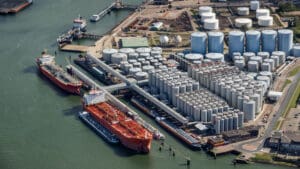
The UK has announced sweeping new sanctions aimed at crippling Russia’s energy revenues, targeting the country’s largest oil producers, state-linked tankers, and overseas partners helping to keep Russian crude flowing to global markets.
Unveiled by Chancellor Rachel Reeves ahead of meetings with global finance leaders in Washington, D.C., the sanctions package includes 90 new measures and represents one of Britain’s most aggressive efforts yet to squeeze Vladimir Putin’s wartime economy.
“We are sending a clear signal: Russian oil is off the market,” Reeves said, pledging to “significantly step up the pressure on Russia and Vladimir Putin’s war effort.”
The sanctions hit Rosneft and Lukoil, Russia’s two biggest oil producers, which together export roughly 3.1 million barrels of oil per day — around 6% of global supply, according to the Treasury.
Rosneft, the larger of the two, accounts for nearly half of all Russian oil output and is a major source of foreign currency for Moscow.
The UK is also blacklisting 44 tankers linked to Russia’s so-called “shadow fleet” — vessels used to transport oil under opaque ownership structures to evade existing Western sanctions.
Reeves said the move was designed to “destroy the capability of the Russian government to continue this illegal war in Ukraine.”
In a significant expansion of the UK’s sanctions regime, the list also includes entities based in India and China accused of helping to channel Russian crude into global markets.
Among them is Nayara Energy Limited, one of India’s largest private refiners, which is partly owned by Rosneft. The UK government said the company imported 100 million barrels of Russian oil worth more than $5 billion (£3.75 billion) in 2024 alone.
“We are ramping up pressure on companies in third countries, including India and China, that continue to facilitate getting Russian oil onto global markets,” Reeves said.
Beijing and Delhi have become key destinations for Russian oil exports since Western nations imposed a G7 price cap and banned seaborne imports of Russian crude in 2022.
Reeves made the announcement alongside Foreign Secretary Yvette Cooper on the sidelines of the International Monetary Fund’s annual meetings, where discussions with G7 counterparts focused on tightening sanctions and exploring ways to use frozen Russian assets to support Ukraine.
“Today’s action is another step towards a just and lasting peace in Ukraine, and towards a more secure United Kingdom,” Cooper said.
The G7 is expected to debate a proposal next week to seize profits generated by hundreds of billions in frozen Russian investments, much of which is held in cash at the European Central Bank. The EU — long hesitant over potential legal implications — is said to be developing a mechanism to redirect those funds to Ukraine.
Earlier this year, the UK joined the US in sanctioning Gazprom Neft and Surgutneftegas, expanding restrictions to cover nearly all of Russia’s major energy producers. At the time, then–Foreign Secretary David Lammy said the measures would “drain Russia’s war chest – and every ruble we take from Putin’s hands helps save Ukrainian lives.”
The latest round intensifies pressure not only on Moscow but also on countries that continue to buy discounted Russian crude.
In Washington, US Treasury Secretary Scott Bessent confirmed that the White House is considering tariffs of up to 500% on Chinese goods linked to Russian oil purchases — though he added that the US would only act “if our European partners will join us.”
“We will respond if our European partners will join us,” Bessent told reporters on Wednesday.
The UK sanctions come as the IMF warns of slowing global growth and rising geopolitical fragmentation — with the war in Ukraine, the Israel–Gaza conflict, and trade tensions between the US and China all weighing on economic stability.
Read more:
UK targets Russian oil market with new sanctions on Lukoil, Rosneft and ‘Shadow Fleet’






